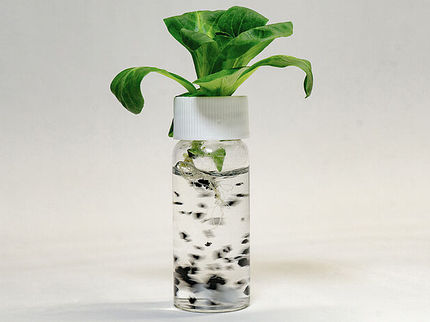Straws and disposable tableware: Also made of paper often with harmful chemicals for the environment and health
The supposedly better alternative is often not better at all, scientists emphasize
(dpa) Instead of the banned plastic straws, many restaurants now offer paper straws. However, these can also be harmful to the environment and health, warns a research team in the journal "Food Additives & Contaminants: Part A". Many supposedly environmentally friendly drinking straws made of paper or bamboo contain long-lasting and potentially toxic chemicals known as PFAS. The sale of plastic drinking straws has been banned in the EU since July 3, 2021.
The group led by Thimo Groffen of the University of Antwerp had examined drinking straws from 39 brands available in Belgium. PFASs were detected in 18 of 20 paper straws tested. The scientists also detected such substances in varying amounts in four out of five bamboo straws, three out of four plastic straws and even in two out of five glass drinking straws. Only in stainless steel straws were no PFASs found.
Using a special mass spectrometry technique, the researchers found trifluoroacetic acid and trifluoromethanesulfonic acid, among others. "Both of these chemicals are highly soluble in water, so there is a risk of them passing from the straw into the beverage," the researchers explain. Whether and to what extent these and other PFAS from drinking straws are absorbed by humans now needs to be studied in more detail, they say.
PFAS - per- and polyfluorinated alkyl compounds - are used, among other things, to protect paper straws from soaking. The study authors emphasize that the potentially hazardous substances do not necessarily have to have been deliberately added in the manufacturing process. They could also enter the product through contaminated feedstock or process water.
"Straws made from plant-based materials such as paper and bamboo are often advertised as more sustainable and environmentally friendly than those made from plastic," Groffen said. "However, the presence of PFAS in these straws means that is not necessarily true." Small amounts of PFAS, he said, are not harmful in themselves, but could increase the chemical exposure already present in the body. "The
most sustainable alternative appears to be stainless steel straws, which can be reused, do not contain PFAS and can be fully recycled," the team concludes.
Paper cups as a substitute for disposable plastic cups have been studied by a research team at the University of Gothenburg. Since paper is neither grease nor water resistant, it must be provided with a surface coating when used as a packaging material for food. Often, this plastic film consists of polylactide (PLA), a type of bioplastic made from renewable raw materials such as corn.
In the study presented in the journal "Environmental Pollution," the team led by Bethanie Carney Almroth exposed mosquito larvae of the species Chironomus riparius to water and sediment in which parts of cups and lids for them made of polypropylene or polystyrene as well as polylactide and paper had been lying for one to four weeks. According to the study, Chironomus riparius is a model species for toxicological studies and represents an important group of aquatic organisms that are critical to ecosystems. "All of the cups had a negative effect on the growth of the mosquito larvae," Carney Almroth said.
According to the study, various harmful substances are released from the material into the environment. "Paper-based food packaging can contain high levels of per- and polyfluorinated alkyl compounds," the study said, among other things. The effect was greater the longer the material had been in water or sediment. "Bioplastics contain at least as many chemicals as conventional plastics," Carney Almroth said. In addition, bioplastics do not degrade effectively; resulting microplastics are ingested by living organisms, just as with other
plastics.
"Paper packaging also poses a potential health risk compared to other materials, and it is becoming more common," the scientist pointed out. After World War II, she said, disposable products came onto the market and were advertised in large campaigns - humanity now needs to move away from this wrong path again. It is time to say goodbye to the throwaway lifestyle - for the environment and for our own health.
PFAS are man-made chemicals that are used in many areas. They make textiles breathable and water-repellent, paper dirt-, grease- and water-repellent, and improve the spreading properties of firefighting foam. PFASs are also sometimes used in food packaging.
Because many PFAS are very persistent and hardly degradable, they are also called eternity chemicals. They continue to accumulate in the environment. PFAS have been linked to various health problems, including lower birth weight in infants, thyroid disease, elevated cholesterol, liver damage, kidney and testicular cancer.
Some PFAS are already widely banned because they are considered hazardous. "Of the relatively few PFAS that have been well studied, most are considered to be of moderate to high toxicity, especially to child development," according to the European Environment Agency (EEA). For the vast majority of PFASs, it is not yet known how they affect humans and the environment. Many experts assume that at least some of them have negative properties.
Note: This article has been translated using a computer system without human intervention. LUMITOS offers these automatic translations to present a wider range of current news. Since this article has been translated with automatic translation, it is possible that it contains errors in vocabulary, syntax or grammar. The original article in German can be found here.
Other news from the department science
Most read news
More news from our other portals
See the theme worlds for related content
Topic World Mass Spectrometry
Mass spectrometry enables us to detect and identify molecules and reveal their structure. Whether in chemistry, biochemistry or forensics - mass spectrometry opens up unexpected insights into the composition of our world. Immerse yourself in the fascinating world of mass spectrometry!

Topic World Mass Spectrometry
Mass spectrometry enables us to detect and identify molecules and reveal their structure. Whether in chemistry, biochemistry or forensics - mass spectrometry opens up unexpected insights into the composition of our world. Immerse yourself in the fascinating world of mass spectrometry!
























































